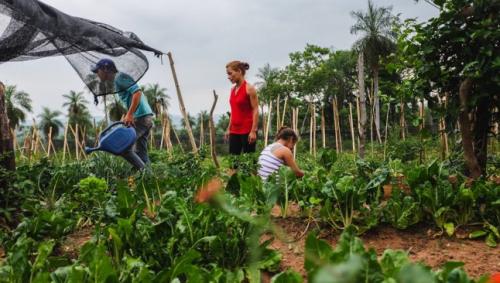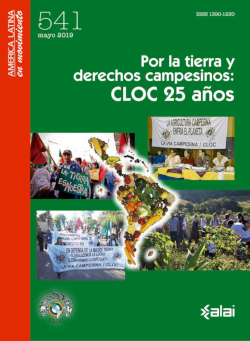Peasants’ view of the United Nations Decade of Family Farming
Agribusiness corporations, in the name of productivity, have destroyed thousands of hectares of forests, hills, mountains.
- Opinión

| Article published in ALAI’s magazine No. 541: Por la tierra y derechos campesinos: CLOC 25 años 09/05/2019 |
Humanity, for thousands of years, has been able to adapt and domesticate seeds, which gave rise to the art of being a farmer. Entire villages have specialised in this art to feed their people, and with time, have expanded their seeds and the knowledge necessary to make them more productive. And along with this noble work, animals were also domesticated to work the land; this is how the techniques for agriculture were developed, improved and adapted to each place. All of this was carried out in harmony with nature, taking into account the position of the sun and the moon for the sowing of seeds, and in a complementary relationship with living things, such as, for example, bees, an animal that has been and continues to be essential for pollination. Thus, the different peoples celebrate their love for life, thanking gods and goddesses for good harvests.
Currently, the relationship with life is changing; there is no more mysticism and today, everything is economics.
For the last 30 years, the advancement of technology has given humanity a certain advantage, because it has improved and facilitated agricultural production; however, new technologies are in the hands of large transnational corporations, who have accumulated and concentrated the production and distribution chain of food throughout the world: a monopoly they defend upon the pretence of fighting hunger throughout the world. This is completely untrue; hunger has increased, even if the mass media does not show it.
Agribusiness corporations, in the name of productivity, have destroyed thousands of hectares of forests, hills, mountains; they have displaced entire indigenous peasant families and diverted rivers in order to impose their monocultures of genetically modified organisms (GMOs) based on agrotoxins.
Bees, people, animals and plants are poisoned with agrotoxins that irrigate trees, soybeans, maize, banana plantations, etc.
These companies, with their economic power, have not only advertised their false solutions, but have also dominated national and international spaces to influence the decisions of multilateral organisations in favour of themselves, neglecting and making invisible family, peasant and indigenous agriculture.
Making our voice heard in international spaces where decisions that affect our day-to-day life and production are taken, has been both a great battle and a great victory for our peasant organisations.
The Latin American Coordination of Peasants’ Organisations of La Via Campesina (CLOC – LVC) is a continental movement of coordination and struggle on the part of peasant men and women in defence of the human, economic, cultural, social and political rights of the people and in defence of production, peasant life and social and community ownership of the land and natural resources; in this way, we prioritise the defence of peasant agriculture and the strategic nature of the struggle for food sovereignty, comprehensive agrarian reform, gender equality, the care of mother earth, the defence of natural resources, seeds as the people’s heritage, agroecology and biodiversity, in which agriculture is practised by peasant men and women in the countryside.
With these principles held high, we are collaborating with other allied organisations to conduct another campaign, our campaign, in international spaces such as the United Nations Food and Agriculture Organisation, better known as the FAO, the specialised body of the UN that directs international activities aimed at eliminating hunger.
Start of the ‘Decade’
After the International Year of Family Farming in 2014, which aimed to raise awareness of the important socio-economic, environmental and cultural role of indigenous peasant farming in the struggle to eliminate hunger and poverty, the FAO has announced new actions.
On 20 December 2017, the United Nations General Assembly adopted a project through which it declared 2019-2028 as the United Nations Decade of Family Farming, and called upon the FAO and the International Fund for Agricultural Development (IFAD) to lead the implementation of the initiative. 2019 marks the start of the Decade of Family Farming, which is aimed at attracting greater attention to the people who produce more than 80 percent of the planet’s food, but who, paradoxically, are often the most vulnerable to hunger.
As CLOC – Via Campesina, we believe that the Decade of Family Farming represents a valuable opportunity to discuss policies for the peasantry at the international level, along with the Declaration of Peasant Rights. We have two tools at the international level with the potential to strengthen peasants.
The document proclaiming the United Nations Decade of Family Farming was developed alongside other organisations at the international level, with the FAO, IFAD and the governments that support this initiative, and we, the peasantry, believe that it has several important points.
Among these important points is the appreciation of peasant and family farming, based on the understanding that it is this type of farming that produces 80 percent of the world’s food. It is clear that the food systems of the multinationals of the agribusiness sector have resulted in countless problems in many respects: pollution with agrotoxins, loss of biodiversity, desertification, degradation, land grabbing; all of this has led to a significant increase in hunger and malnutrition at the international level, and climate change.
This is why family farming is recognised at the international level for its great capacity to reverse this trend, and provide agroecological, healthy food production, while maintaining biodiversity. Quoting the Director-General of the FAO: “Family farming is fundamental to sustainable development in many respects, including the elimination of poverty, hunger and all forms of malnutrition, as well as the preservation of natural resources and biodiversity”, said Graziano da Silva at the ministerial meeting of the Community of Portuguese Speaking Countries (CPLP) on family farming.
The essential points of “differentiated, effective and intersectoral” public policies, stated Graziano da Silva, include guaranteeing access for family farmers to natural resources and the means of production, in particular, land and water, and the promotion of more inclusive markets through instruments for the public procurement of family farming products. He also stressed that countries must strengthen their social protection instruments and offer public incentives for climate change adaptation initiatives, such as, for example, agroecology-related practices. In addition, he highlighted the importance of promoting the economic independence of rural women and the inclusion of young people. Similarly, he stated that it is essential to work on the construction of legislative and institutional frameworks to consolidate food and nutritional sovereignty.
The plan of action document for the Decade of Family Farming contains points of the utmost importance for the peasantry. The intersectional pillars of this document are as follows: supporting young people and guaranteeing the generational sustainability of family farming (1st intersectional Pillar); promoting gender equality in family farming and the leading role of rural women (2nd intersectional Pillar).
New social relations of production and food
We are at a moment in the world in which the main competitors are the large agricultural companies and agro-economies that want to exclusively influence international policies in order to continue profiting economically and commodify natural goods; and on the other hand, peasant, artisanal fishing, indigenous, and pastoral organisations, who believe in the food sovereignty of the people, who produce healthy and nutritious food, and who generate most of the work in the countryside and respect the cycles of our mother earth in our production.
In this context, and understanding that representatives of the Decade will also speak with the private sector, agribusiness producers and governments, as CLOC – LVC, our challenge is to generate the optimal conditions to allow discussions to take place and so that policies of food sovereignty, agroecology and people’s agrarian reform are emphasised.
As CLOC – LVC, we have been able to build a lot in these 25 years of continental organisation. Not only do we develop and promote the struggle against transnationals and the hydro-agro-mining export and industrial agricultural model that violates the rights and lives of peasants, but we have built and formulated concrete alternatives in the territories to strengthen our model of indigenous peasant production.
Peasant universities, institutes and schools of agroecology, academics and other popular bodies have allowed political training to be strengthened; these must continue to multiply and expand in the countryside and in the cities.
The Decade is an opportunity to further deepen our collective work to influence the building of new social relations of production and food from the indigenous peasant perspective, and new social relations between men and women in the countryside and in the cities.
It is necessary to overcome this current and dominant economic, political, social and cultural model, which historically emerged from the colonisation of Latin America and is intertwined with patriarchy, racism and discrimination, in order to build a new society.
(Translation La Via Campesina)
- Deolinda Carrizo and Rodolfo Greco, from the National Coordination of the National Indigenous Peasant Movement (MNCI-Argentina).
Del mismo autor
Clasificado en
Soberanía Alimentaria
- Gerson Castellano, Pedro Carrano 30/03/2022
- Silvia Ribeiro 29/03/2022
- Germán Gorraiz López 28/03/2022
- Silvia Ribeiro 16/02/2022
- Clara Sánchez Guevara 15/02/2022

